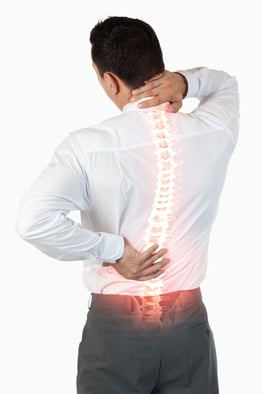 Back problems are one of the most frequent reasons that people seek to file a disability claim. For those with degenerative disc disease, you already know how debilitating the pain can be – oftentimes to the point of being unable to work.
Back problems are one of the most frequent reasons that people seek to file a disability claim. For those with degenerative disc disease, you already know how debilitating the pain can be – oftentimes to the point of being unable to work.
If you find that you are unable to continue working due to degenerative disc disease, you may be considering filing for long term disability. However, a simple claim of back pain alone won’t be sufficient basis for a claim with your insurance company.
Below we’ll outline what is needed when filing for long term disability for degenerative disc disease.
Is Degenerative Disc Disease A Disability?
Yes, degenerative disc disease can be disabling. The weakening of your discs can lead to excruciating, chronic pain worsened by work activities. Whether or not your degenerative disc disease is classified as a disability will depend on the severity and frequency of your pain. Some with this condition find the pain bearable and sporadic enough to not interfere with their job duties. For others, the pain is recurrent and severe, resulting in long term disability.
Disabling Symptoms of Degenerative Disc Disease
Degenerative disc disease generally develops over many years as the discs between vertebrae dehydrate and shrink. The discs serve as cushioning between the bony vertebrae that form your spine. Without adequate padding between the bones, pain happens as a result of osteoarthritis or other rubbing and chafing between the unprotected bones.
The exact nature of your degenerative disc disease will depend on the location of your weakened discs and the rate of their degeneration. However, degenerative disc disease is commonly characterized by the following:
-
-
- Chronic, sharp pain in the back
- Intermittent and recurrent pain, with occasional pain flare ups (referred to as “acute episodes”)
- Pain may extend to neck, thighs, or buttocks
- Pain worsened by extended periods of sitting
- Pain worsened by twisting, bending, and/or lifting weight
- Pain lessened by lying down
- Pain lessened by movement (i.e. walking, stretching, changing positions)
-
Inability to Work Due to Degenerative Disc Disease
 When filing a long term disability claim for degenerative disc disease, your insurance company will want to know the nature of your symptoms and how they specifically impair your ability to work.
When filing a long term disability claim for degenerative disc disease, your insurance company will want to know the nature of your symptoms and how they specifically impair your ability to work.
For example, if your occupation involves working at a desk for long hours, your degenerative disc disease pain may be aggravated by the amount of static sitting. In order to manage your pain, you may require changing your position, standing and walking, and taking breaks too frequent to do your job effectively.
It is important to communicate to your insurance company the ways your pain make it difficult, if not impossible, to perform your specific job duties.
How Do I Prove My Degenerative Disc Disease As A Disability?
Degenerative disc disease can be a challenging condition to prove as disabling to insurance companies. While the debilitating pain of degenerative disc disease is very real, pain is considered a “subjective” symptom. Your insurance company will want objective medical evidence to back up your disability claim.
 Your Diagnosis is Essential
Your Diagnosis is Essential
The first thing your insurance company will require is proof of your degenerative disc disease diagnosis.
There may not be any outward symptoms of degenerative disc disease until you start developing pain. At that point, the level of degeneration can be quite advanced.
A doctor will be able to diagnose your degenerative disc disease through spinal imaging tests such as X-rays, MRIs, and CT scans. These scans can determine the degree of degeneration that you are suffering from. By comparing the thickness of your weakened disc to other normally functioning discs in your spine, your doctor can measure the progression of degeneration.
The degeneration of a disc is usually quite apparent because the disk's thickness will not match the thickness of other normally functioning disks in your spine. The doctor may perform other tests to determine whether or not you have associated problems such as osteoarthritis or osteoporosis.
Document Your Pain
While pain is considered a subjective symptom, it can be useful to explain to your insurance company in your own words the disabling symptoms you’ve been experiencing and how they conflict with your ability to work.
This can mean:
-
-
- Writing a narrative. Writing a personal narrative describing the history of your condition, your symptoms, as well as your difficulties at work and declining productivity can be useful for your claim.
- Keep a Degenerative Disc Disease Diary. One way to provide evidence of your degenerative disc disease pain to your insurance company is by keeping a “diary” of your condition. Each day, write a description of the symptoms you are experiencing. Rate your pain on a 1-to-10 scale; explain what restrictions and limitations you had for your daily activities; note any doctor or hospital visits. Be specific—the more detailed you are, the more effective your diary will be as evidence of your condition.
-
Consider a Functional Capacity Evaluation
In order to fully substantiate your degenerative disc disease’s restrictions and limitations on your daily functioning, you may consider undergoing a Functional Capacity Evaluation (FCE). An FCE is a physical exam testing your physical strength, postural intolerances, balance, level of fatigue, range of motion, ability to lift/carry, ability to sit/stand/walk, ability to perform fine and gross manipulations, and more. This testing can support your diagnosis and disabling symptoms for your long term disability insurance claim.
What Treatment Will the Insurance Company Want to See?
In nearly every long term disability insurance policy, there is a requirement that the claimant must seek “appropriate treatment” for their condition. This means that if your insurance company believes you have not followed your doctor’s recommendations to manage your degenerative disc disease, they may be able to deny your claim or terminate your benefits.
Surgical Options for Degenerative Disc Disease
The most common surgical treatment for degenerative disc disease is spinal fusion. This procedure is usually performed on the cervical (neck) and lumbar (lower back) portions of the spine. Surgeons will “fuse” together the vertebrae on either side of the degraded disk by placing small strips of live bone grafts onto the affected vertebrae. The bone then grows and forms a hardened surface between the vertebrae. In ideal circumstances, this will restore rigidity and stability to the spinal column. If the degeneration is more severe, the surgeon may fuse together more than two vertebrae.
The recovery process for spinal fusion surgery can be very arduous and the surgery is not always successful. You may be out of work for a very long time and if you have not already qualified for disability payments prior to surgery, you may experience substantial financial hardship.
Pain Management for Degenerative Disc Disease
When spinal surgery is not possible—or if it is unsuccessful—pain management is another option for those with degenerative disc disease.
Pain management treatment may include:
-
-
- Prescription pain medication. For degenerative disc pain that is too severe for over-the-counter medications, prescription pain medication may be suitable. Muscle relaxants or narcotics may be prescribed by your treating doctor to help manage your pain.
- Steroid injections. Epidural steroid injections can be done in the spine to relieve severe pain in the spine. These injections provide temporary relief, ranging from weeks to months.
- Physical therapy. Usually in tandem with other pain management treatment, physical therapy may be recommended to help strengthen back, neck, and core muscles.
-
How Can A Disability Attorney Help?
A long term disability insurance attorney can help you build a strong case for receiving long term disability benefits.
Degenerative disc disease can be difficult to substantiate to your insurance company due to the subjective nature of back pain. An experienced disability attorney will know what medical evidence your insurance company is seeking, additional testing options to substantiate your claim, and other ways you can provide proof of your disability.
Conclusion
If you have been diagnosed with degenerative disc disease and your symptoms are making it difficult or impossible for you to work, the New York long term disability lawyers at Riemer Hess can help you navigate the claims process and make your strongest case for benefits. Our disability attorneys are experienced in developing disability claims based on back pain and damaged vertebral disks.
Riemer Hess can assess your situation, explain your legal rights and options, and answer any questions you have about long term disability insurance. To schedule your free consultation, call Riemer Hess LLC, Attorneys at Law, today at 212-297-0700.















